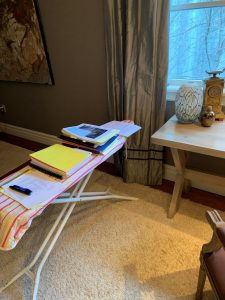May 2020
As a result of COVID-19 many people have been forced to adapt to work from home. Working from home, especially all day, every day, requires an adjustment, whether you typically thrive in a home environment or not. After eight weeks of restrictions due to COVID-19, we are starting to settle in to working from home, even if we are going a little stir crazy. Maybe you finally got that home office cleared out. Or maybe you have settled in to working from your kitchen table with your ironing board set up for use as an extra workspace! We are all adjusting differently.

When you are also dealing with pain from an injury it can be especially difficult to adjust. Perhaps you had an ergonomic assessment completed on your workspace and have ergonomic equipment or multiple monitors available at work. Your physical requirements may not be the same from home and it could be that your work looks quite different from home than what you were able to do at the workplace.
Working from home in a pandemic presents in own challenges. These challenges are exacerbated when you are suffering from pain that impacts your ability to sit at a desk for long periods of time, or are suffering from headaches that make it hard to look at a screen for long periods. Many of us who have managed our symptoms through the use of supports, such as ergonomic workspaces and equipment, multiple monitors, printing off long documents, etc. are facing an extra layer of stress as we try to adapt. In addition, with restrictions on health care professions, many of us cannot obtain the treatment we need. The increased stress of the situation we are facing is impacting our concentration and it is harder to stay focused at home, whether it is because of other family members (including fur-kids), that laundry that needs to be done, an inability to stay away from the news, or maybe just a beautiful sunny spring day.

Across the country, provinces are looking at re-opening and what that might look like, and there is a hope we may be able to return to work – at work – and slowly return to normal soon. However, public heath officials continue to warn that we should not let our guards down, and that a return to “normal” may look very different than pre-pandemic normal. This will no doubt include social distancing guidelines that will continue to impact us in the longer term. It is worth considering whether you could improve your current set-up at home.
Consider the following tips for making your time working from home more enjoyable (or bearable, wherever you are on the spectrum!). These include those tips that already exist for working in an office setting, which become even more important when you are working from home, especially while recovering from an injury:
- Bring your ergonomic equipment home, to the best of your ability. Your chair, second monitor, screen protector, and magic bag can always be returned when you are back in the office. You may wish to consider investing in ergonomic equipment for your home if your return will include continued work from home in the long term. Look into whether there may be funding available for additional equipment, either through your employer and/or through your health or auto insurance provider, with your doctor’s prescription.
- Take a physical break at least every hour – get up out of your chair and move around. Set a timer. In theory, this should be easier to do when you are home as you can be more flexible. You may also be able to be more flexible in your hours so you can work at times when you feel fresh and plan to rest when you do not.
- Particularly for those with concussions/headaches, take an “eye” break every 20 minutes, during which time you look away from the screen for at least 20 seconds.
- “Deskercise”, or short stretching exercises to do at your desk, continue to be a great idea when you are home. You could even expand the routine now that your co-workers can’t see you!
- Maintain as much of a regular schedule as possible. This includes getting up and starting work at the same time every day. Plan your breakfast and lunch so there is less to think about when you get hungry.
- By now you have likely started to figure out what works for you and what doesn’t. Set up your workspace and your schedule in a way that works best for you as an individual. Some experts suggest you work in a different room than you break in. Other experts suggest you mix up your work area. If you are experiencing pain that is helped with an ergonomic set-up, it may make the most sense for you to find a spot, arrange it appropriately and stick with it. Conversely, you may find that moving around throughout the day is more helpful to you.
- Do not forget the importance of regular exercise (outside if possible), eating healthy, drinking lots of water, and maintaining good sleep habits. Be aware of how much tension you are holding in your body that can lead to clenching your jaw and shoulders.
- Get yourself a good heating/cooling pad, TENS machine, stretching/strengthening routine or other supports, as recommended by your treatment team. For concussion injuries, this could include blue tinted glasses, a second or third monitor, or a printer. Speak with your treatment providers about options available and be open to new ideas in this new situation.
- Download and use a computer program to block out harmful light colours and change your screen’s colours to adapt to the time of day. See https://justgetflux.com/ for a free software option.
- Seek out support from others, whether they are friends, family, co-workers, treatment providers, or other online supports. For concussion survivors, the Brain Injury Association of Nova Scotia is continuing to host their Concussion Café (a peer-lead support and discussion group) via Zoom Meetings (see https://braininjuryns.com/concussion-mild-tbi/).
- Remember no one is working at full capacity right now. It is okay to be less productive. It is okay to not be okay. Whether you are a parent struggling to juggle work and school/childcare, single and struggling with being isolated or a couple struggling to manage your finances, we are all working to adapt and survive in the face of layers of stressors. It is especially important to take care of our mental health during this time, to forgive ourselves, and to understand what we are feeling is normal.
Be kind to yourself!
If you have any questions about your accident and injuries including accessing treatment, then please reach out at 902.422.5881 or info@mdwlaw.ca.
